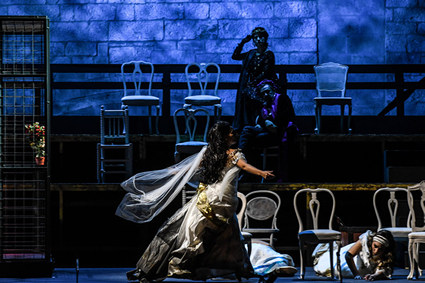| Opera Reviews | 20 April 2024 |
Richard Strauss takes centre stage at the Festival Della Valle D'Itriaby Silvia Luraghi |
|
Strauss, R: Il borghese gentiluomo |
|

|
|
|
Even having to deal with all sorts of restrictions caused by the current coronavirus situation, and constrained by short term planning, the Festival della Valle d’Itria lived up to its vocation and offered a real rarity, staging the first version of Richard Strauss’ Ariadne auf Naxos (in Italian translation, as Arianna a Nasso) preceded by what was originally intended to be a first act of a complex, multi-modal performance: Hugo von Hofmannstahl’s Der Bürger als Edelmann (The Bourgeois Gentleman), with music by Strauss. Strauss and Hofmannstahl wrote the work encouraged by Max Reinhardt, who staged it in 1902 in Stuttgart. In this early version, it was Monsieur Jourdain, the Bourgeois of the title, who commissioned a musical composition to conform with his desired social status. It turned out to be a great fiasco, and even Hofmannstahl’s second try, when Bürger was presented as an independent piece of theater/dance with some additional music, was a failure, so it soon disappeared from the stages. Ariadne in turn acquired its final version, with the short prologue that set the action in Vienna. In Martina Franca, the second version of the Bürger was staged alternating with Ariadne. Both works were given a new Italian translation by Quirino Principe: this was decided following the restriction on travels, which resulted in a mostly Italian cast. For the new version of Bürger, Strauss added some more music, including three dances by Lully, who had composed the original music for Molière’s comédie-ballet. Ballet numbers were at the core of this performance, with outstanding dancers Fabrizio Di Franco and Matilde Gherardi. Singing sections included initial couplets by Monsieur Jourdain, the outstanding baritone Vittorio Prato, a pastoral intermezzo with contralto Ana Victoria Pitts and soprano Barbara Massaro, and the complex “Turkish ceremony” in the finale, with the male chorus of the Turks, joined in the conclusion by the three soloists. The orchestra of Bari’s Teatro Petruzzelli, which also played in Ariadne, was conducted by Michele Spotti, while the stage director Davide Gasparro also appeared on stage to recite some reflections on the role of the arts and of artists. Arianna a Nasso followed on the next night. This was the real highlight of the festival, with Fabio Luisi at the head of the orchestra providing a strong lead as a renowned Strauss expert. The vocal cast was excellent: in the title role, soprano Carmela Remigio gave her debut as Ariadne. Her nicely colored voice depicted an introvert and sorrowful character, difficult to reach by those who tried to communicate with her: Zerbinetta, the breathtaking soprano Jessica Pratt, who managed the demanding coloratura and received an ovation at the end of her aria, and Bacco, tenor Piero Pretti, who showcased his handsome and well-tuned voice in the final duet. The cast was skillfully completed by Vittorio Prato as Arlecchino, Manuel Amati as Brighella, Eugenio Di Lieto as Truffaldino, Vassily Solodkyy as Scaramuccia, Mariam Battistelli as Eco, Ana Victoria Pitts as Driade and Barbara Massaro as Naiade. The performance was directed by Walter Pagliaro, who managed to make the most of the scanty setting designed by Gianni Carluccio to highlight the introspective character of the opera. The audience reacted with enthusiasm, and from the resounding applause one could have had the impression that the venue was as full as in previous years. Hopefully it will go back to normal in the near future.
|
|
| Text ©
Silvia Luraghi Photo © Clarissa Lapolla |
|







